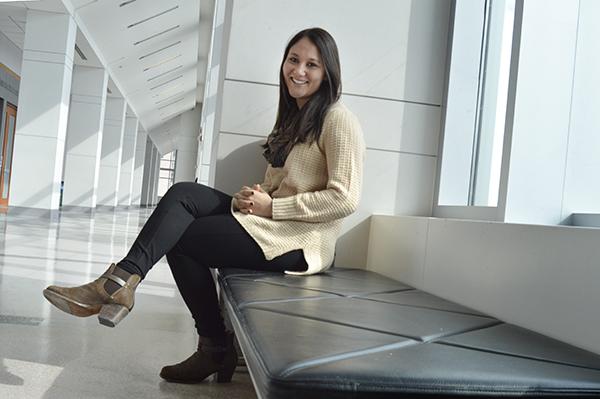A junior who has served on the cabinets of two student body presidents is the first female student to announce her campaign for the Student Association’s top post this year.
Andie Dowd will run on a platform centered on health and wellness resources on campus, including placing sexual assault hotline numbers on the back of GWorld cards, putting sexual assault resources on GW’s smartphone app and improving 4-RIDE services.
“A majority of schools have their resources on the back of their ID cards. I think it’s incredibly important, especially for freshmen,” she said. “It has all those numbers right there so they can seek help immediately, especially for those that don’t know.”
The last two SA presidential candidates who ran on improving mental health resources at GW won their elections. Former president Julia Susuni successfully lobbied to move counseling and health service centers to the heart of campus, and current SA President Nick Gumas’ peer-counseling program was approved this semester.
Dowd said she will also work to make 4-RIDE more like the car service Uber so students are able to see the car on a map and know when the vehicle will arrive, similar to Northwestern University’s SafeRide system.
She added that she’d like to integrate the UASK app into the official GW app. UASK, a project by the national organization Men Can Stop Rape and D.C.’s Office of Victim Services, lists sexual violence resources and can connect victims to local services after an assault.
As a member of the SA’s health and wellness task force, Dowd voiced student concerns about counseling and health services being located off campus, and then helped plan the move to the Marvin Center as one of eight students in the working group. If elected, she would work to implement the new peer-counseling program.
She said more than 250 students have already volunteered for the program, and that existing connections with administrators like Senior Associate Dean of Students Mark Levine would help her launch her plans.
“We’ve already had huge success with this, and I think it’s just very important that we keep pushing for that,” Dowd said. “We pushed for a system that’s the best.”
Dowd was a member of the Freshman Advisory Council, which gathers input on students’ first year experiences at GW, and was the director of new students her sophomore year. She helped create a new SA position geared toward transfer students, and is now the vice president for undergraduate student policy in the executive cabinet, where she focuses on non-academic policies for undergraduates.
A member of Alpha Delta Pi sorority, the University Honors Program and the GW Equestrian Team, she said she would also work toward creating more student space on campus and gather student input about the soon-to-be-open District House and food vendors in J Street. The University’s contract with its food provider, Sodexo, will end in 2016.
She said it was important to concentrate on keeping areas available to students and not allow administrators to utilize it as office space. The fifth floor of Marvin Center was converted from student space to offices in 2012.
“It’s really important that as we refer to this as our student hub that it remains so,” she said.
Renovating the Multicultural Student Services Center is also a priority for the Elliott School of International Affairs student. She said she would push administrators to fund renovations to the more than 100-year-old building, as well as to large residence halls like Thurston Hall.
She said if she could not get larger renovations approved, she would ask for new furniture and look for other solutions to make the space welcoming and structurally sound for students. The building currently has crumbling walls and ceilings, among other problems.
“I understand it’s a very big expense and I understand the University is not interested in doing that,” Dowd said. “The MSSC is an incredibly small building for a lot of students. Right now the resources are incredible in there, but when you have thousands of students that want to go in there, it gets a little difficult.”






